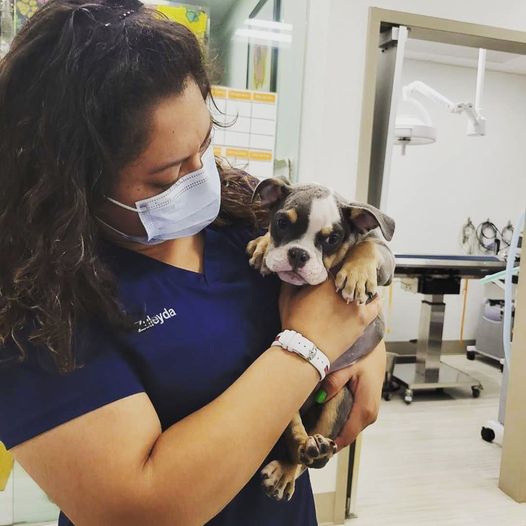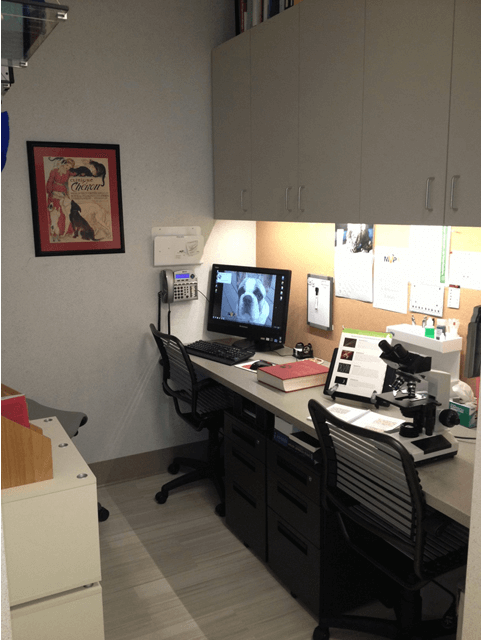Oftentimes, we find ourselves trying to convince pet owners to listen to the veterinarian’s advice if it contradicts their breeder’s advice. This is our response to try to educate and inform pet owners.
In the veterinary field, we often find ourselves talking to clients whose breeders offered unsolicited medical advice. In some instances, breeders require contractually obligated adherence to their recommended medical advice placing owners in the middle of what their Veterinarian recommends and what their breeder recommends.
Breeders and veterinarians should have a great working relationship. Your puppy or kitten should have been examined by a Veterinarian prior to going to your home. This visit should come with medical paperwork, including the Veterinarian’s exam notes regarding your pet. An exam is different than a paper showing a vaccine sticker or a deworming date.
As in any business, there is a large varying degree of breeders. Some may have incredible relationships with their local veterinarians – a great sign!
There are no breeder standards, restrictions, or required licensing or testing. This means anyone can call themselves a breeder and they do not need to meet any type of qualifications to breed and sell animals.
Most importantly, breeders do not go to veterinary school.

They do not have a license to practice veterinary medicine and they did not receive the required education to make medical recommendations regarding your animal.
A breeder’s objective is to produce and sell puppies and kittens.
A Veterinarian’s goal is to keep your pet healthy for its whole life.
Here are some reasons to trust your veterinarian’s advice:
- Doctorate in Veterinary Medicine: Veterinarians complete a minimum of 8 years of higher education to earn their degree, Veterinary Specialists complete 8+ years
- Licensing Exam: After receiving a degree from an accredited program, your Veterinarian also had to pass a licensing exam in order to practice veterinary medicine
- Continuing Education: Veterinarians are required to stay up-to-date on the latest medical information by attending a minimum number of hours of class each year
- Veterinarian Intranetwork: Access to thousands of Veterinarians in the world to consult and discuss cases with
- Working Knowledge: Years of working experience with a variety of cases
9 Common Scenarios and Our Responses:
Breeder suggests waiting to go to the Vet soon after purchase
Oftentimes, a breeder will have given a vaccine to your pet soon before pick-up. While we would need to wait at least two weeks before administering any other vaccines, we recommend establishing care early on and getting an initial exam. This allows our team to be sure your pet is on the right track and to set up a recommended vaccine schedule with you. This appointment also allows us to go over recommended wellness care and routine preventatives so that your pet can get started on these as soon as possible.
Many times, we also diagnose infections at the initial appointment from ear and eye infections to skin infections. We also will certainly want to check a fecal sample. Most breeders give a broad-spectrum deworming that does not necessarily get some of the common parasites we see in puppies and kittens such as Giardia and Coccidia.
We recommend establishing care with a veterinarian soon after you pick up your pet.
Breeder says your pet has received all its vaccines
All vaccines, with the exception of Rabies and oral Bordetella, must be boosted in order for immunity to develop. Puppies and kittens are born with maternal antibodies that help protect them during the first few weeks after birth. However, eventually, these antibodies dissipate and the puppy and kitten need vaccines to boost their own immune response. To create the appropriate response, vaccines need to be given in a series, no less than 2 weeks apart and for MLV (combination) vaccines, it is recommended to have the last booster no earlier than 16 weeks of age. Typically, when a breeder says this, they are implying that for your pet’s age, it has received the appropriate vaccines.
If your pet is under 16 weeks of age, there is no way that it has completed its vaccines.
Breeder does not recommend any vaccines prior to 6 months old
Your pet is most susceptible to these diseases from a very young age (<6 months) as this is when the immune system is not fully developed. These diseases are preventable by early vaccination.
While we would recommend starting the vaccine sooner, we can work with you should you choose to wait.
Breeder says not to give oral flea and tick prevention
Flea and tick prevention is recommended as early as 6 – 8 weeks of age. There are options for both oral and topical flea and tick prevention, but there is no reason to use topical over oral. In rare instances, a pet can have a reaction to topical (rash, burns) or oral (vomiting, diarrhea). There is a small percentage of pets that have pre-existing neurological disorders where oral flea and tick prevention is not recommended not because the prevention causes these disorders, but can exacerbate it.
While we love oral preventatives because they are so easy to give, it is completely fine if you want to select topical preventatives. All that matters is that your pet is on preventatives.
Breeder says not to start Heartworm Prevention until X months old
Heartworm Disease is passed by mosquitos and your pet is susceptible to a mosquito bite at any age. It takes about 6 months for heartworm to develop from larvae to mature adults. If you wait until your pet is older to start prevention, it may be too late. Heartworm treatment is costly, high-risk and the disease itself can have lifelong implications for your pet.
We recommend that all of our patients start lifelong preventatives at 8 weeks old.
Breeder says not to give leptospirosis or lyme vaccines
Lyme Disease is spread by ticks, which are very prevalent in this area. Virginia is a high-risk state for Lyme Disease and approximately 1 in 30 dogs test positive for Lyme Disease in Fairfax County alone. Lyme Disease, if acquired, can have lifelong implications even after treatment. Our practice diagnoses Lyme Disease weekly.
Leptospirosis is a bacterial disease carried by wildlife such as deer, foxes, and raccoons, which are all common to this area. If acquired, it affects the organs, such as the liver and kidneys, but it can easily be prevented by vaccinations. Leptospirosis is often fatal in dogs and the vaccine is highly effective. It is also Zoonotic, meaning your dog could pass it to your family members, including children.
The risk of a severe, life-threatening vaccine reaction is extremely low and can be managed by separating the vaccines from others and pre-treating the animal with an antihistamine.
We recommend that all of our patients get both vaccines, however, if you told us that you only wanted to do one of the two then we recommend the Lepto vaccine as it is often fatal and Lyme Disease is treatable and hopefully the prevention you give monthly reduces that risk as well.
Breeder says not to give a Rabies vaccine at the same time as other vaccines
There is no evidence to indicate a Rabies vaccine is more effective if given by itself versus along with another vaccine. There is also no scientific evidence to support that giving it at the same time as another vaccine increases the risk of a reaction.
If you choose to give the Rabies vaccine alone, that is no problem! It is often given in combination with other vaccines so that your pet is able to venture out safely at an earlier date, but we can split them up if needed.
Breeder recommends a grain-free or all-natural, organic diet
Currently, the FDA has no requirements regarding pet food standards. The pet food industry is unregulated. Any company can create and sell pet food, which is why there are many foods on the market. Many of these companies are not primarily in the animal industry, if at all, but rather excel in marketing or celebrity endorsements. Some of these companies even lack a veterinarian on staff to verify the nutritional balance of their food and many do not spend the money to send the food through feeding trials since there are no regulations.
The Association of American Feed Control Officials (AAFCO) and their veterinarians have established their own dietary guidelines and put their seal of approval on foods considered balanced.
The companies below have veterinarians on staff and perform food trials to be sure their diets are balanced and meet the requirements presented by AAFCO. These are the brands that we recommend:
- Hill’s
- Royal Canin
- Purina
- Iams
There are a lot of people that think veterinarians get a kickback from these food companies, but this is not true. We do not get anything when you walk into a store and pick a bag of food for your pet.
Grain-free pet food has been linked to serious heart disease and is not a recommended diet for pets. Remember, just because it is more expensive, doesn’t mean it is the best option.
To ensure that your pet is on a balanced diet made for animals, the pet food company you choose should have veterinarians on staff. The above brands are tested, balanced, and safe for the life of your pet.
Breeder says your pet is dewormed
Some intestinal parasites are passed from mother to baby during birth which is why it is essential to start treatment early. Due to the lifecycle of intestinal parasites, such as hookworms, puppies and kittens need to be dewormed every couple of weeks from 2 – 8 weeks of age. If the breeder did not follow this recommendation by the Companion Animal Parasite Council, then two deworming treatments should be given two weeks apart along with monthly prevention.
In young animals, these intestinal parasites can lead to severe intestinal problems, anemia, and even death if untreated. Testing a stool sample is also important for puppies and kittens because there is a multitude of parasites that they can pick up from the environment that need more specialized treatment.
There are parasites that can be passed to people and children so it’s important to deworm properly and often and to ensure a negative fecal test at certain intervals.
















